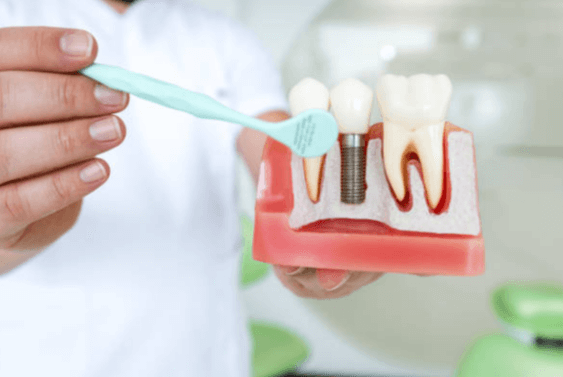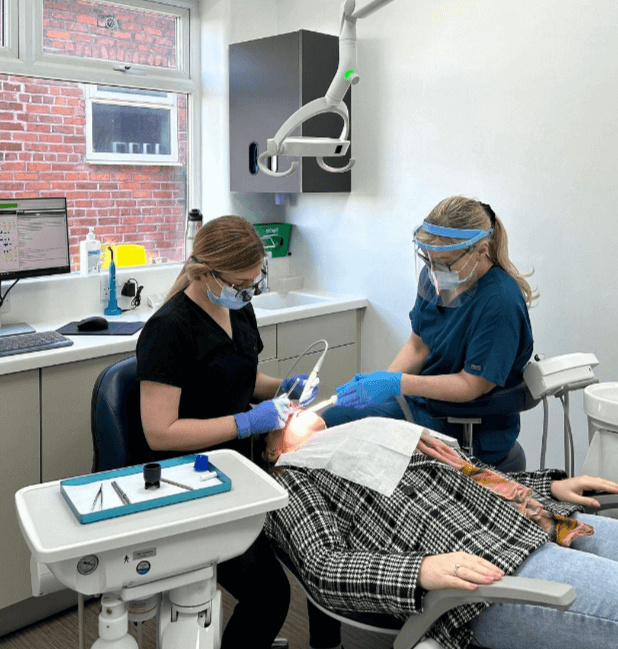Replacing missing teeth with dental implants is a common and successful procedure. Dental implants can be expensive, but the final price tag will depend on several variables. One dental implant can cost between $2,500 and $5000, as reported by the American Academy of Implant Dentistry.
Additional treatments, like bone grafting, can drive up the price. The experience and proximity of the dentist putting in the implants can also play a role in the final price. People thinking about getting dental implants would be well to familiarize themselves with the variables that go into determining the final price tag, as well as explore their financing options.
In this article, we will discuss how much dental implants typically cost, what elements go into determining this price, and the various payment plans available to patients.

Dental Implant Estimated Costs in Various U.S States of 2023
| State | Estimated Cost of Single Implant |
|---|---|
| California | $3,500 – $5,000 |
| Florida | $3,000 – $4,500 |
| Texas | $3,000 – $4,000 |
| New York | $3,500 – $5,000 |
| Illinois | $3,000 – $5,000 |
| Pennsylvania | $2,500 – $4,500 |
| Ohio | $2,500 – $4,000 |
| Michigan | $2,500 – $4,000 |
| Georgia | $3,000 – $4,500 |
| North Carolina | $3,000 – $4,500 |
| Virginia | $3,000 – $4,500 |
| New Jersey | $3,500 – $5,000 |
| Massachusetts | $3,500 – $5,000 |
| Washington | $3,500 – $5,000 |
| Arizona | $3,000 – $4,500 |
| Colorado | $3,000 – $4,500 |
| Maryland | $3,000 – $4,500 |
| Indiana | $2,500 – $4,000 |
| Tennessee | $2,500 – $4,000 |
| Missouri | $2,500 – $4,000 |
| Wisconsin | $2,500 – $4,000 |
| Minnesota | $2,500 – $4,000 |
| Oregon | $3,000 – $4,500 |
| South Carolina | $3,000 – $4,500 |
| Alabama | $2,500 – $4,000 |
| Louisiana | $2,500 – $4,000 |
| Kentucky | $2,500 – $4,000 |
| Oklahoma | $2,500 – $4,000 |
| Utah | $2,500 – $4,000 |
| Iowa | $2,500 – $4,000 |
| Arkansas | $2,500 – $4,000 |
| Nevada | $3,500 – $5,000 |
| Mississippi | $2,500 – $4,000 |
| Kansas | $2,500 – $4,000 |
| New Mexico | $2,500 – $4,000 |
| Nebraska | $2,500 – $4,000 |
| West Virginia | $2,500 – $4,000 |
| Idaho | $2,500 – $4,000 |
| Hawaii | $3,500 – $5,000 |
| New Hampshire | $3,500 – $5,000 |
| Maine | $3,500 – $5,000 |
| Montana | $2,500 – $4,000 |
| Rhode Island | $3,500 – $5,000 |
| Delaware | $3,000 – $4,500 |
Factors that Affect Dental Implant Cost
The final price tag for your dental implant procedure may depend on several variables. The price of dental implants may be affected by the following:
- Number of Implants: The cost will increase proportionally as the number of implants increases. It will cost more to have dental implants if you need a whole mouth reconstruction than if you just need one or two.
- Location: Dental implant prices can change significantly from one clinic to the next. Dental implant therapy is typically more expensive in major cities compared to smaller towns.
- Implant Material: Titanium, zirconia, and ceramic are just a few of the materials that can be used to create dental implants. The material utilized in the implant will determine how much it will cost.
- Implant Brand: The price of dental implants might vary widely between different manufacturers. Brands that cost more may use higher-quality components or offer longer service periods.
- Type of Implant Procedure: Dental implant operations range from replacing a single tooth to replacing a whole arch. Costs vary from procedure to procedure.
- Pre-implant Procedures: Dental implant procedures can be performed to replace a single tooth or an entire arch. Procedure costs can differ widely.
- Dentist’s Experience: Single teeth or a full arch of teeth can be replaced using dental implants. The price tag for a procedure may vary greatly.
- Insurance Coverage: Dental implants can replace a single tooth or a whole arch of teeth. Procedure costs can range widely.
How to Budget for Dental Implants

Although dental implants may require a sizable financial commitment, they have been shown to improve oral health, usefulness, and aesthetics in a wide range of patients. To help you plan for the cost of dental implants, consider the following:
- Get a Detailed Cost Estimate: Obtaining a precise estimate from your dentist is the first step in planning for the financial implications of getting dental implants. Make that the cost of the implant, any necessary pre-implant procedures, and any necessary follow-up care are all accounted for in the estimate.
- Check Insurance Coverage: Dental implant costs could be partially or fully covered by your dental insurance. It’s also a good idea to see if your implant operation is covered by your health insurance.
- Consider Financing Options: Consider dental loans, promotional interest credit cards, or the practice’s payment plan if you don’t have enough money saved to pay for dental implants out of pocket.
- Prioritize Your Dental Needs: If you need more than one dental procedure, you should schedule them in the order of urgency. Prioritizing your dental needs may help you budget for dental care over time.
- Look for Affordable Options: You could look into getting small implants or implants made out of cheaper materials if you need a dental implant but are on a tight budget.
- Save Up: Start putting money down now for the dental implant operation if you have some time before you need it. Save up a fixed amount of money every month until you have enough to pay for it.
The Hidden Costs of Dental Implants
Dental implants can be helpful in many ways, but they also come with a few surprises. Some of the less obvious expenses associated with getting dental implants are as follows.
- Pre-Implant Procedures: Pre-implant operations like bone grafting, sinus lifts, and extractions may be necessary depending on the state of your oral health. The total price of dental implants may increase if these steps are necessary.
- Follow-Up Care: Depending on your dental health, you may need pre-implant surgery such as bone grafts, sinus lifts, or extractions. If further procedures like these are needed, the final cost of dental implants could go up.
- Replacement Costs: Pre-implant surgery, including bone grafts, sinus lifts, or extractions, may be necessary depending on the state of your oral health. The total price of dental implants may increase if additional operations like these are required.
- Maintenance Costs: Depending on your dental health, you may need pre-implant surgery such as bone grafting, sinus lifts, or extractions. Additional procedures like these can add to the overall cost of dental implants.
- Potential Complications: Pre-implant surgery, like as bone grafts, sinus lifts, or extractions, may be necessary depending on the state of your oral health. The total cost of dental implants may increase if these kinds of operations are required.
- Travel Costs: The condition of your mouth will determine whether or not you need pre-implant surgery, which may include bone grafts, sinus lifts, or extractions. Dental implant prices may rise if further procedures are necessary.
Dental Implants vs. Other Tooth Replacement Options

There are numerous solutions for missing teeth, including dental implants. Here is how dental implants stack up against alternative methods of tooth replacement:
- Dental Implants: When it comes to replacing missing teeth, dental implants are your best bet. They are fixed in place in the jawbone and mimic the appearance and performance of natural teeth, making them a reliable and secure solution for eating and talking. In contrast to certain other tooth replacement methods, they also aid to preserve the jaw bone.
- Dentures: Dentures are an option for replacing one or more missing teeth that can be removed and cleaned like normal teeth. They’re less expensive than dental implants, but they’re not as secure and need frequent adjustments. They can also make it difficult to enjoy the flavor of some foods.
- Bridges: Bridges are a type of fixed prosthetic dentistry that permanently replaces a missing tooth by anchoring a prosthetic tooth to the teeth on each side of the gap. They’re less expensive than dental implants, but you might have to sacrifice some good enamel to anchor the bridge in place. Furthermore, unlike dental implants, they do not help to preserve jawbone health.
- Partial Dentures: When many teeth need to be replaced, partial dentures are an option. They have metal clasps that allow you to take them out whenever you want to clean your teeth. They are less expensive than other options, but they may not be as stable and may irritate your gums and teeth.
- Flipper: A flipper is a false tooth made of plastic that snaps onto a retainer. They are frequently employed as a stopgap measure before more permanent tooth replacement methods can be implemented. They are less expensive than other tooth replacement choices, but they may not be as pleasant or stable.
How Dental Insurance Can Help Pay for Dental Implants
Some of the expenses of dental implants may be covered by dental health insurance. Some benefits of dental insurance include:
- Coverage for Pre-Implant Procedures: Some pre-implant operations, like as bone grafting or extractions, may be covered by your dental insurance plan.
- Coverage for the Implant Itself: Dental implant procedures are sometimes covered by insurance.
- Coverage for Follow-Up Care: Follow-up care, like checkups and any necessary changes to the implant, may be covered by dental insurance.
- Out-of-Network Coverage: If your dental insurance policy covers services from dentists who are not in its network, you may have more flexibility in choosing an oral surgeon who is experienced with dental implants.
Note: Please be aware that dental implant coverage varies widely across dental insurance providers. Review your dental insurance policy thoroughly to learn what is and is not covered before getting dental implants. If your dental insurance doesn’t cover the full cost of the procedure, you should discuss payment and financing options with your dentist.
Finding Cheap Dental Implants Without Sacrificing Quality
It can be difficult to find affordable dental implants without sacrificing quality, but there are steps you can take to ensure you receive the best deal possible. In order to save money on dental implants, consider the following:
- Don’t go with the first dental implant clinic you find. Compare the costs and quality of service offered by several local dental offices. Think about not only their skills but also their track record and reputation.
- Discounts and bargains on dental implant services are common marketing strategies used by many dental implant companies. There are often deals to be had, such as reduced implant prices or even free consultations.
- Dental implants may be a good candidate for “dental tourism,” the practice of visiting abroad to receive dental care. Before going abroad for dental care, however, you need to make sure you know a lot about the facility and the dentists who will be treating you.
- See if dental implants are covered by your insurance or if there is a list of dentists who are on the insurance’s “preferred” list to receive savings.
- To help patients deal with the expense of getting dental implants, many clinics offer payment plans or loans.
Financing Dental Implants: Exploring Your Options

Although getting dental implants can put a significant dent in your bank account, there are numerous ways to spread out the payment. Here are some potential sources of funding:
- Payment Plans: The expense of getting dental implants can be stretched out over a period of months or even years by enrolling in one of the many payment plans offered by implant clinics. Interest may or may not be included in certain payment options.
- Credit Cards: Credit cards are sometimes accepted as payment for dental implant procedures. Credit cards with special interest rate promotions or cash-back benefits for medical costs are available.
- Personal Loans: To pay for your dental implant procedure, you may choose to apply for a personal loan from a bank or an internet lender. Most personal loans feature monthly payments and interest rates that are fixed.
- Health Savings Account (HSA): Dental implants are an eligible expense for reimbursement from a Health Savings Account (HSA) provided by an employer. HSAs are accounts that help you save money tax-free for future medical costs.
- CareCredit: Dental implants can be paid for using a healthcare credit card like CareCredit. Medical costs can be financed at promotional rates of interest.
Dental Implants Abroad: Price and Quality to Think About
Dental implant surgery performed in a foreign country can be enticing for patients looking to save money. But before you decide to have dental implants abroad, there are a few things to think about in terms of price and quality.
Cost considerations:
- Travel Costs: The cost of dental implants abroad may increase significantly when you include the price of getting there. Expenses like airfare, accommodation, and transportation may add up quickly.
- Exchange Rates: Dental implants purchased abroad may be affected by fluctuations in the exchange rate. When calculating the overall price of the procedure, it is essential to factor in currency conversion costs and exchange rates.
Quality considerations:
- Dental Training and Certification: The requirements for becoming a dentist in a given country may differ from those in another. It’s crucial that you check the credentials of the dentists doing the treatment.
- Language and Communication: When seeking dental care abroad, you may encounter language and communication barriers. It’s crucial that you and the dentists involved in your care be able to communicate effectively.
- Postoperative Care: Dental implant aftercare must be carefully considered. When deciding where to have dental implants, it’s crucial to think about where you’ll be getting postoperative treatment and how good it is.
- Legal Recourse: In some nations, you may have little or no legal options available to you. You should familiarize yourself with the legal safeguards to which you may be entitled in the event of issues or conflicts.











